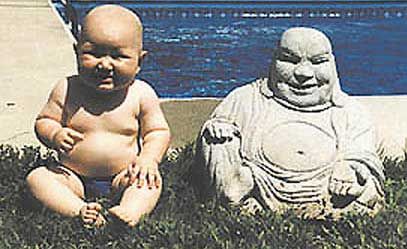Originally appeared here.
 I am plodding on with Plantinga’s Warranted Christian Belief, which I strongly recommend. He is committed to the Christian (and Jewish and Muslim) belief that not only that there is such a being as God, but also that we are able to address him in prayer, refer to him, think and talk about him, and predicate properties of him. This means using unique descriptions like ‘all-powerful’, ‘all-knowing’, ‘creator of the world’ etc by means of which we can single him out, giving a proper name such as ‘Yhwh’ to him via such reference-fixing descriptions.
I am plodding on with Plantinga’s Warranted Christian Belief, which I strongly recommend. He is committed to the Christian (and Jewish and Muslim) belief that not only that there is such a being as God, but also that we are able to address him in prayer, refer to him, think and talk about him, and predicate properties of him. This means using unique descriptions like ‘all-powerful’, ‘all-knowing’, ‘creator of the world’ etc by means of which we can single him out, giving a proper name such as ‘Yhwh’ to him via such reference-fixing descriptions.
The challenge for this belief is the idea, which Plantinga claims is widely accepted among theologians (I am not sure how to check this), ‘that Kant showed that reference to or thought about such a being (even if there is one) is impossible or at least deeply problematic’. To counter this, he devotes a whole chapter to showing that Kant did not show or prove this with anything the certainty that we might think.
He considers two competing scholarly interpretations of Kant. According to the one world picture, the terms ‘transcendental objects’ and ‘empirical objects’ should be understood to refer not to two different kinds of entity, but rather to different ways of talking about one and the same thing. He notes that this picture ‘would be accepted even by such staunch pre-revolutionaries as Aristotle and Aquinas.
According to the two world picture, which is the traditional interpretation, Kant held that there are two realms of objects, i.e. noumenal and phenomenal, which are fundamentally different. Noumena are things as they are in themselves, phenomena or ‘appearances’ are things as they are for us.
Appearances are the sole objects which can be given to us immediately, and that in them which relates immediately to the object is called intuition. Appearances are not things in themselves; they are only representations, which in turn have their object—an object which cannot be intuited by us, and which may, therefore, be named the non-empirical, that is, transcendental object = x. (A109)Phenomena are objects that exist in space and time, noumena are neither temporal nor spatial, since space and time ‘are forms of our intuition rather than realities that characterize the things in themselves.’ Since phenomena are constructed by us out of the raw data of experience, they depend on us for their existence. Noumena, on the other hand, do not depend on us for their existence, as they are things as they are in themselves. They form two disjoint worlds: no phenomenal object is a noumenon, no noumenal object is a phenomenon.
Regarding the one world picture, if our concepts apply to anything, then to the things, because these are the only things there are. And if we refer, we refer to things. What would it mean to say that the category of causality does not apply to the things? This would mean is that noumena do not stand in causal relations to each other or anything else, and hence the complement property, namely not standing in causal relation, would apply to things. This seems problematic. What about being non-self-identical? And if no positive properties apply to things, we would make a mistake if we said that God is wise, or good, or powerful, or loving. ‘That would be because nothing is wise, good, powerful, loving, and the like.’
The two world picture makes more sense, because 'things' can then refer to phenomenal things. But how do we predicate one thing of another? This requires concepts. On a radical version of the two world picture, (as Plantinga interprets Kant) concepts are a sort of rule for synthesizing the perceptual manifold, i.e. ‘constructing’ phenomenal things out of the ‘blooming buzzing confusion’. Hence your concept of a horse is a sort of rule for putting together different items of experience, into a phenomenal object. And of course such a concept cannot apply to noumena, since they are not ‘given’ to us in experience, and so we cannot construct an object out of them. Moreover, it is not just that no noumenon is a horse, it is also that no noumenon is a non horse, since ‘being a nonhorse’ is also a rule for constructing a phenomenal object from the perceptual manifold. ‘So thought of, a concept could no more apply to [a noumenon] than a horse could be a number.
On this radical interpretation, our concepts do not apply to God, for God would have to be a noumenon, rather than something we have constructed from the perceptual manifold. And so, interpreted this way, ‘we can’t refer to, think about, or predicate properties of God’.
In the first place, Plantinga argues that this picture is deeply incoherent. Kant holds that noumena are causally connected to us, yet (on the radical interpretation) we should not be able to refer to them at all or attribute to them the properties of being atemporal and aspatial, ‘or even speculate that there might be such things’. Kant’s thought founders on the fact that the picture requires that he have knowledge the picture denies him. If this picture were really correct, the noumena would have to drop out altogether, so that all remains is what has been structured by us. The idea that there might be reality beyond what we ourselves have constructed out of experience would not be so much as thinkable.
In the second place, what powerful arguments does Kant deploy to justify the ‘startling’ conclusion that we can’t think about, refer to, or predicate properties of the noumena, given that concepts are really rules for synthesizing the (perceptual) manifold into phenomenal objects and so the only things we can think about are objects we ourselves have somehow constructed. What reasons does Kant give?
According to Plantinga, these reasons are ‘distressingly scarce’. Perhaps ‘those who urge [Kant's theory] are simply overwhelmed by what they see as its sheer intellectual beauty and power; they don’t feel the need of argument. Indeed, they find the picture so dazzling they are willing to put up with a strong dose of incoherence in addition to absence of argument’. But that, he says ‘doesn’t constitute much of a reason for the rest of us—those of us more impressed by the incoherence of the picture than its beauty—to accept it’ (laughter at the back of class).
The best he can find are the antinomical arguments, supposedly powerful lines of reasoning on opposing sides of a given question (such as whether the world had a beginning in time). Kant apparently intended the antinomies to support his transcendental idealism. They confront us with the problem that we take ourselves to be thinking about things in themselves – the noumena – as opposed to the things for us, the phenomena.
If in employing the principles of understanding we do not merely apply our reason to objects of experience, but venture to extend these principles beyond the limits of experience, there arise pseudo-rational doctrines which can neither hope for confirmation in experience nor fear refutation by it. Each of them is not only in itself free from contradiction, but finds conditions of its necessity in the very nature of reason—only that, unfortunately, the assertion of the opposite has, on its side, grounds that are just as valid and necessary. (A421, B449)But he finds the antinomical arguments not ‘to put the best face on it, at all compelling’. Take the argument about the beginning of the world
If we assume that the world had no beginning in time, then up to every given moment an eternity has elapsed, and there has passed away in the world an infinite series of successive states of things. Now the infinity of a series consists in the fact that it can never be completed through successive synthesis. It thus follows that it is impossible for an infinite world-series to have passed away, and that a beginning of the world is therefore a necessary condition of the world’s existence. (A426, B454)‘I am sorry to say it is hard to take seriously’, says Plantinga! Kant begins with the assumption that an infinite series can’t be completed by starting from some point finitely far from the beginning and adding members finitely many at a time at a constant rate, which is true. But it doesn’t follow that it is impossible for an infinite world-series to have passed away, and that a beginning of the world is therefore a necessary condition of the world’s existence, for this just claims what was to be proved: that the series in question had a beginning!
To conclude, as Kant does, that it is impossible that an infinite series of events has occurred is just to assume that the series in question had a beginning—that is, is finite—but that is precisely what was to be proved. So the argument really has no force at all.It’s all very entertaining. I haven’t put on my especially reinforced thinking hat to examine the chapter in great depth, nor have I checked through my Kant to be certain of the ‘distressingly scarce’ claim. But I shall ask Vallicella the next time I see him.
 I have been working through Alvin Plantinga’s excellent (but frustrating) book Warranted Christian Belief, and I am particularly intrigued by his critique of the work of theologian
I have been working through Alvin Plantinga’s excellent (but frustrating) book Warranted Christian Belief, and I am particularly intrigued by his critique of the work of theologian  Dale
Dale 
